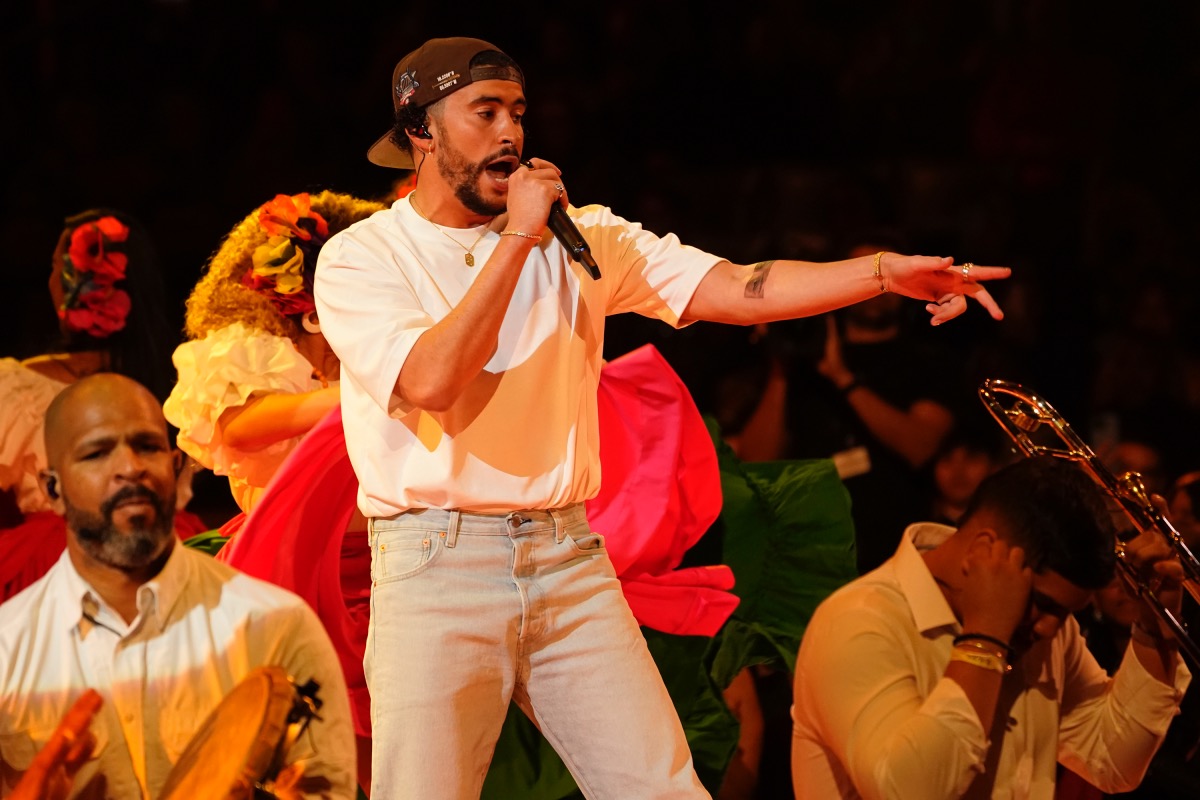

Bad Bunny performs a medley on stage at the 65th annual Grammy Awards on Sunday, February 5, 2023, in Los Angeles. (AP Photo/Chris Pizzello)
Puerto Rican reggaetonero Benito Antonio Martínez Ocasio —also known as Bad Bunny, the biggest musical supernova in the galaxy— opened the 65th Grammy Awards with an ode to the Caribbean and used plena dancers, cabezudos, and his lyrics to present the complicated reality of Puerto Rico.
Benito opened the show —or the “gringo Grammy,” as he calls it— with a percussion blast of plena, a unique Puerto Rican concoction of Latin American and African musical traditions used by Boricuas to communicate and critique society. It is a powerful symbol of Puerto Rican culture.
His first salvo was the song “El Apagón” —“Puerto Rico está bien cabrón!“— which tells the story of an island in darkness and Boricuas fighting gentrification and colonization. “Yo no me quiero ir de aquí,” the song says—I don’t want to leave from here. “Que se vayan ellos.”
The cabezudos, used in cultural presentations, were the second salvo. The giant paper-mache heads brought the spirit of the Fiestas de la Calle San Sebastian to the Grammys, depicting Puerto Rican icons like the independentista poet Julia de Burgos, rapper Tego Calderón, composer and salsa singer Ismael Rivera, poet Lola Rodríguez de Tió, and baseball legend Roberto Clemente.
This was all lost on CBS, the network broadcasting the event, which was caught unaware —didn’t they rehearse?— or didn’t understand what language Bad Bunny sang and spoke in. So they decided to caption it with: “speaking non-English, singing in non-English.”
Actually insane!!! pic.twitter.com/Cpuf1JxYlg
— dina (@chiquitadina_) February 6, 2023
Remember that Bad Bunny has two previous Grammy wins, has been nominated for 26 Latin Grammys, with nine wins, and has won eight Billboard Music Awards. So he’s not exactly an unknown figure.
CBS should have known that San Benito is too big to be ignored. Un Verano Sin Ti generated over four billion U.S. streams across several platforms last year and was the biggest album of the year.
This is a usual practice for live closed captioning, where the people doing the captions don’t have the time to add a translation and thus use the “speaking non-English” as a catchall for other languages and is a function built into the system.
But the lyrics for “El Apagón” and “Después de la Playa— (which Bad Bunny also sang in his medley— are all over the internet, and the producers surely had time to arrange something than the standard “singing in non-English.” I guess they thought that a bilingual captioner just didn’t exist or that simply looking up a translation was too time-consuming.
The captions did not sit well with many Latinos watching, who responded angrily via social media, calling the reductive captions insulting, ignorant, and even racist. Not far off the mark, but it’s probably more an issue of being tone-deaf because, let’s face it, CBS (and they are not the only ones) either didn’t get it or just didn’t care. And that’s the problem.
But the beauty is that you have 62.5 million Latinos watching in the U.S. —and millions more that love Bad Bunny worldwide— that will no longer allow the powers that be to get away with such slights.
After the backlash, the Grammys were rebroadcast in primetime on the West Coast with updated Spanish-language closed captioning for Bad Bunny’s performance. If you go to the on-demand feed of the Grammys on Paramount+, the closed captioning in Spanish is also there.
Now how hard was that?
In the end, Bad Bunny’s blockbuster album did not win Album of the Year, but that doesn’t matter. He is still the first Spanish-language artist nominated for the award, which went to British singer Harry Styles. Bad Bunny did take home a Grammy in the Música Urbana category.
I don’t think the gringo audience understands the frustration and anger Boricuas feel, especially the younger generation, Benito’s generation—la generación del “Yo no me dejo.”
Young Boricuas grew up under a $70 billion debt; a fiscal control board; cuts to education, pensions, and health services; the aftermath of hurricanes Irma and María; earthquakes; corrupt governments; a pandemic. Now they face the island’s gentrification that marginalizes Puerto Ricans in their own homeland.
The generación del “Yo no me dejo” was radicalized by what they lived through. They took to the streets and brought down the pro-statehood government of Gov. Ricardo Rosselló in the summer of 2019 and actively want an end to the colonial relationship with the United States.
Bad Bunny is the voice of his generation, and this is what is lost in translation.
He made this clear when he accepted his first award as a non-English performer. “I always knew that I could become a huge artist without changing my culture, my slang, and my language,” he told the audience in Spanish. “I am Benito Antonio Martínez Ocasio, from Puerto Rico to the world.”
Nonetheless, CBS’ flub did launch a cottage industry. T-shirts with the “Singing in Non-English, Speaking in Non-English” caption are selling like pan caliente on social media.
I already bought mine.
***
 Susanne Ramirez de Arellano is the former News Director for Univision Puerto Rico and a writer and journalist living in New York City. Comments can be sent to her email. Twitter: @DurgaOne
Susanne Ramirez de Arellano is the former News Director for Univision Puerto Rico and a writer and journalist living in New York City. Comments can be sent to her email. Twitter: @DurgaOne


